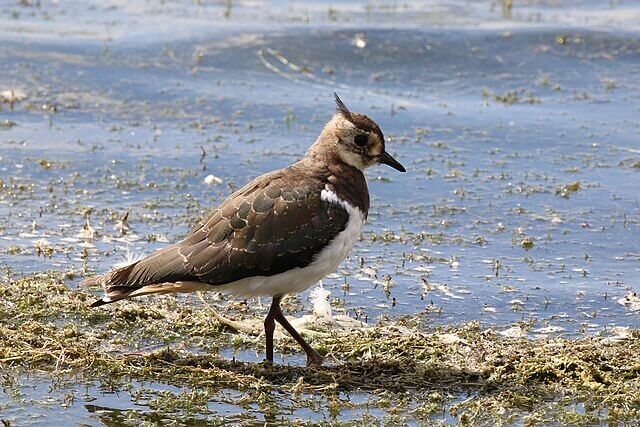
In a heartening turn of events, endangered lapwings have made a triumphant return to County Down’s Lecale Fens, marking a significant conservation achievement.
For the first time in years, two breeding pairs of lapwings have been sighted in this special area of conservation, located just outside Downpatrick, Northern Ireland.
The lapwing, classified as red-listed on the Birds of Conservation Concern in Ireland, is a priority species in Northern Ireland. Their dwindling numbers over the past four decades can be attributed to the loss of their wetland habitats and shifts in farming practices. These distinctive birds require a specific range of habitats for breeding, favouring open, boggy areas with bare ground or short vegetation while avoiding densely covered spaces.
Collaborating with local farmer John Crea, Ulster Wildlife has been diligently working on conservation efforts since 2018. Their endeavours involved eradicating invasive species and scrub, such as rhododendrons, from Lecale Fens, using specialised amphibious machinery.
Simon Gray, peatland conservation officer with Ulster Wildlife, highlighted that these conservation efforts have spanned five years.
“In the past, this area was managed by grazing or burning to stop scrub taking over and drying out the fen, but given climate concerns associated with peat burning and risks to livestock from deep water we had to come up with new and innovative solutions,” he said.
“Five years later and we’re thrilled to see our restoration efforts reap rewards for biodiversity, with Lecale Fens moving towards a healthy condition again.”
Gray said that it holds promise not only for the lapwing but also for other wildlife, including dragonflies, snipe, and the silver hook moth.
“It’s brilliant to see these birds doing so well and we hope they come back again next year to breed,” he said.
John Crea, the local farmer, expressed his delight at witnessing the return of lapwings to his farm. Ulster Wildlife’s conservation initiatives extend beyond Lecale Fens, collaborating with landowners across Northern Ireland to restore designated peatland sites and address the restoration needs of large-scale peatland areas. The primary goal is to reestablish the diverse species that once thrived in these locations and to harness the various benefits that peatlands offer, from flood prevention to carbon sequestration.
This success story exemplifies the positive outcomes that can be achieved through dedicated conservation efforts and collaboration.
Mr Gray added: “With over 75% of land in Northern Ireland farmed, it is vital that farmers and landowners are properly supported to help restore nature on a landscape scale with peatland sites, such as this, playing a vital role in helping to tackle the nature and climate crisis.”
——————————————————————————
At Natural World Fund, we are passionate about stopping the decline in our wildlife.
The decline in our wildlife is shocking and frightening. Without much more support, many of the animals we know and love will continue in their decline towards extinction.
When you help to restore a patch of degraded land through rewilding to forests, meadows, or wetlands, you have a massive impact on the biodiversity at a local level. You give animals a home and food that they otherwise would not have had, and it has a positive snowball effect on the food chain.
We are convinced that this is much better for the UK than growing lots of fast-growing coniferous trees, solely to remove carbon, that don’t actually help our animals to thrive.
This is why we stand for restoring nature in the UK through responsible rewilding. For us, it is the right thing to do. Let’s do what’s right for nature!
Donate today at https://naturalworldfund.com/ and join in the solution!

